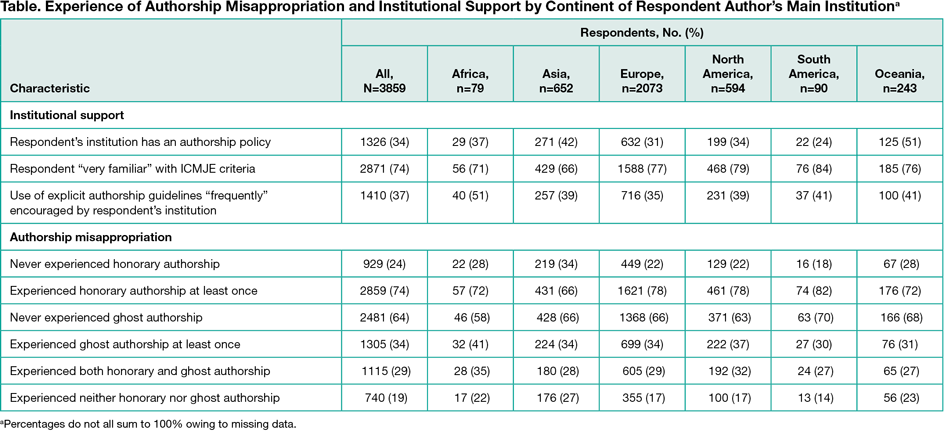Abstract
Researchers’ Awareness and Use of Authorship Guidelines: An International Survey
Sara Schroter,1 Ilaria Montagni,2 Elizabeth Loder,1 Matthias Eikermann,3 Elke Schaeffner,4 Tobias Kurth1
Objective
To understand the degree to which international researchers are currently aware of and apply authorship guidelines in practice and to assess their perceptions of the fairness of authorship decisions.
Design
In September 2016, we invited 12,646 corresponding authors of research papers submitted in 2014 to any of 18 BMJ journals in a range of specialties to complete an online survey.
Results
We received 3859 responses (31%). Respondents varied in terms of research experience and worked in 93 countries. Of the 3859 respondents, 1326 (34%) reported that their institution had an authorship policy providing criteria for authorship; 2871 (74%) were “very familiar” with the International Committee of Medical Journal Editors (ICMJE) authorship criteria; and 3358 (87%) reported that these criteria were beneficial when preparing manuscripts. Furthermore, 2609 (68%) reported that their use was “sometimes” or “frequently” encouraged in their research setting. However, 2859 respondents (74%) reported that they had been involved in a study at least once where someone was added as an author who had not contributed substantially (honorary authorship), and 1305 (34%) were involved in a study at least once where someone was not listed as an author but had contributed substantially to the study or article (ghost authorship). Only 740 (19%) reported that they had never experienced either honorary or ghost authorship; 1115 (29%) reported that they had experienced both at least once in their careers. Table lists respondents’ current perceived institutional support regarding authorship guidelines and their experience of authorship misappropriation by continent. While there are some differences by continent, there is no clear pattern. In regard to the last article that respondents coauthored, 2187 (57%) reported that explicit authorship criteria had been used to decide who should be an author, and 3088 (80%) felt the decision made was fair. When institutions frequently encouraged the use of authorship guidelines, authorship eligibility was more likely to be discussed at an early stage (817 of 1410, 58%) and was perceived as fairer (1273 of 1410 , 90%) compared with infrequent encouragement (974 of 2449, 40% and 1891 of 2449, 74%).
Conclusions
These results reflect current practice in international research across a range of specialties. While 74% of these authors are aware of guidelines, guidelines are not as frequently endorsed by institutions. Explicit encouragement of use of authorship criteria by institutions resulted in more favorable use of guidelines by author teams.
1The BMJ, London, UK, sschroter@bmj.com; 2University of Bordeaux, Bordeaux, France; 3Critical Care Division, Massachusetts General Hospital, Boston, MA, USA; 4Charité–Universitätsmedizin Berlin, Berlin, Germany
Conflict of Interest Disclosures:
Sara Schroter is a full-time employee at BMJ. Tobias Kurth is a consulting editor for BMJ. Elizabeth Loder received salary from BMJ for services as head of research, paid to her employer, the Brigham and Women’s Physician Organization.

